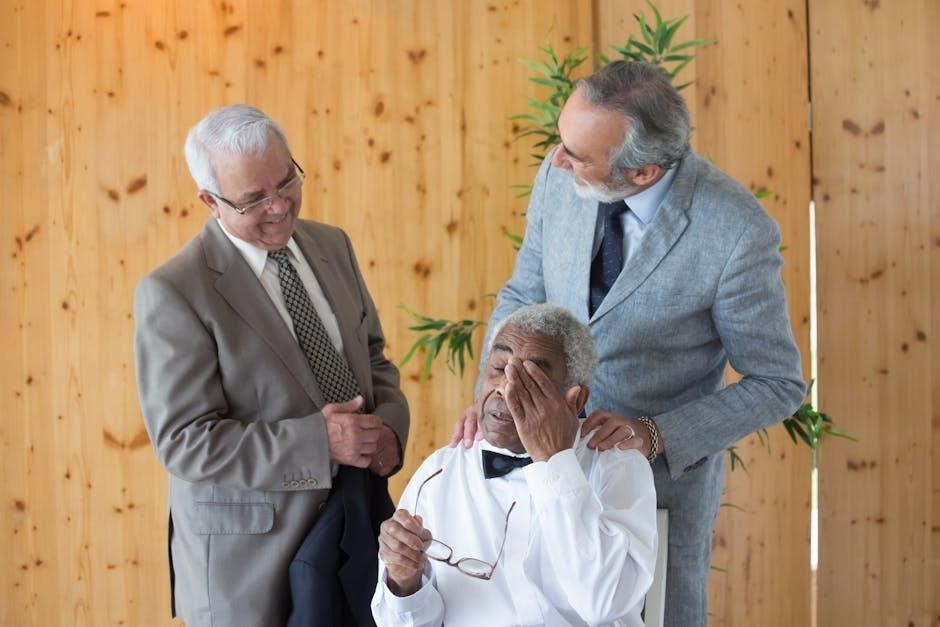
Emotional sobriety is a profound concept that extends beyond physical abstinence, focusing on emotional health and resilience. It is a journey toward inner peace and harmony.
Understanding the Concept of Emotional Sobriety
Emotional sobriety refers to the ability to manage emotions healthily, free from unhealthy dependencies and unrealistic expectations. It is a state of emotional resilience, where individuals can navigate life’s challenges without being controlled by their feelings. This concept, deeply explored by Bill Wilson in his 1958 essay, emphasizes breaking free from emotional turmoil and fostering inner peace. The collector’s edition of Emotional Sobriety I & II combines insights from AA members, highlighting personal growth and transformations. The idea is not just about abstaining from substances but about achieving emotional balance, allowing individuals to live happily and joyously, guided by love and gratitude rather than self-centered demands.

The Significance of Bill Wilson’s Essay in the Grapevine
Bill Wilson’s 1958 essay, “The Next Frontier: Emotional Sobriety,” published in the AA Grapevine, is a cornerstone of emotional sobriety. It highlights the importance of moving beyond physical recovery to emotional and spiritual growth. Wilson emphasizes breaking free from unhealthy dependencies and demands, which he identifies as the root of disturbances. His essay encourages surrendering these demands with God’s help, enabling individuals to live freely and love unconditionally. The essay also underscores the role of the Twelfth Step in achieving emotional sobriety, making it a vital resource for those seeking deeper recovery. Its inclusion in the collector’s edition underscores its timeless relevance, offering guidance for translating mental conviction into emotional results and living a happy, joyous, and free life.
Bill Wilson’s Vision of Emotional Sobriety

Bill Wilson envisioned emotional sobriety as a state of freedom from unhealthy dependencies, enabling individuals to live happily, joyously, and free through spiritual growth and surrender.
Key Principles of Emotional Sobriety
Emotional sobriety is rooted in freedom from unhealthy dependencies and demands. It involves surrendering self-centeredness, letting go of fear, anger, and envy, and embracing humility. Living in the present, rather than dwelling on the past or fearing the future, is central. Self-reflection and honesty about emotional states are vital, as is the willingness to recognize and release unhealthy patterns. The ability to give without expecting anything in return fosters true emotional fulfillment. Spiritual growth and connection to a higher power further strengthen emotional resilience. These principles guide individuals toward a life of balance, peace, and joy, aligning with Bill Wilson’s vision of emotional freedom.
Breaking Free from Unhealthy Dependencies
Unhealthy dependencies often lie at the root of emotional turmoil. These can manifest as excessive reliance on others, substances, or external validation for self-worth. Breaking free requires self-awareness and a willingness to surrender these demands. By recognizing the patterns that bind us, individuals can begin to release the emotional chains that hinder growth. Trust in a higher power and the support of others play crucial roles in this liberation. Emotional sobriety emerges as one learns to live without these dependencies, fostering a sense of inner freedom and peace. This process is essential for achieving lasting emotional balance and harmony in life.
The Collector’s Edition: Emotional Sobriety I & II
This special hardback edition combines two beloved volumes, offering a keepsake pull-out of Bill W.’s iconic essay. Ideal for AA libraries, gifts, and personal inspiration.
Overview of the Combined Volumes
The Collector’s Edition brings together Emotional Sobriety I and II, offering a comprehensive exploration of emotional growth and recovery. These volumes compile powerful stories from AA members, sharing their journeys from struggle to transformation. The combined books highlight the principles of emotional sobriety, emphasizing freedom from unhealthy dependencies and the importance of love and giving. A special keepsake pull-out features Bill Wilson’s 1958 essay, “The Next Frontier: Emotional Sobriety,” providing timeless insights. This edition is a valuable resource for those seeking deeper understanding and inspiration on their path to emotional resilience and long-term sobriety.
Special Features and Keepsake Elements
The Collector’s Edition is enriched with exclusive features, including a 4-page pull-out of Bill Wilson’s 1958 essay, “The Next Frontier: Emotional Sobriety.” This treasured document offers a foundational understanding of the concept. The hardback binding and premium quality make it a cherished keepsake for AA enthusiasts. Stories from AA members provide personal insights, while the combined volumes ensure accessibility to rare content. This edition is perfect for meetings, gifting, or personal libraries, serving as a lasting reminder of the transformative power of emotional sobriety. Its design and content honor the legacy of AA’s principles, making it a unique and meaningful addition to any recovery journey.

Transformations in Sobriety: Personal Stories
Sober individuals share heartfelt journeys of emotional growth, revealing how AA principles transformed their lives, fostering resilience, and bringing joy through selfless giving and inner peace.

Real-Life Experiences of Emotional Growth
Real-life stories from individuals in recovery reveal profound emotional growth, showcasing their journeys from turmoil to peace. These accounts highlight personal transformations, resilience, and the application of AA principles. Many share how emotional sobriety helped them shift from self-centeredness to empathy and service. Through honest sharing, they illustrate overcoming negative emotions like anger, fear, and resentment, achieving balance and inner harmony. Their experiences underscore the importance of love and giving in recovery, demonstrating that true happiness emerges from selfless acts. These narratives inspire hope, proving that emotional sobriety is attainable and transformative, leading to a life of purpose and fulfillment.
The Role of Love and Giving in Recovery
Love and giving are cornerstone principles in achieving emotional sobriety, fostering a sense of connection and purpose. Through selfless acts, individuals in recovery often discover lasting fulfillment. By focusing on others, they transcend self-centeredness, building stronger relationships and emotional resilience. This shift enables them to practice empathy and kindness, which are vital for sustained emotional health. Bill Wilson emphasized that offering love without expectation is transformative, leading to inner peace and harmony. These principles guide many toward a life of service, creating a ripple effect of compassion and understanding in their communities.

Practical Steps Toward Emotional Sobriety
Recognize and surrender unhealthy dependencies, practice mindfulness, and embrace gratitude to stay grounded. Self-reflection and applying spiritual principles like love and honesty foster emotional balance and freedom.
Translating Mental Conviction into Emotional Results
Translating mental conviction into emotional results involves aligning thoughts with actions and principles. Recognizing unhealthy patterns and surrendering them is key. Through self-reflection and mindfulness, individuals can shift from intellectual understanding to emotional acceptance. Practicing honesty, humility, and love helps bridge the gap. Bill Wilson emphasized that this process is not just for neurotics but for anyone willing to live by right principles. Emotional results manifest as serenity, gratitude, and the ability to love without expectation. This transformation allows individuals to live happily, joyously, and freely, embodying the essence of emotional sobriety.

Living Happy, Joyous, and Free
Living happy, joyous, and free is the ultimate promise of emotional sobriety. It involves a shift from self-centeredness to selflessness, fostering love and gratitude. By letting go of unhealthy demands and dependencies, individuals embrace a life of purpose. Emotional freedom allows us to experience joy in simplicity and find happiness in giving; This state is not about ecstasy but about peace and contentment. Bill Wilson’s vision highlights that emotional sobriety is a journey, not a destination, enabling us to live fully and authentically. Through practice and principles, we can achieve a life that is truly happy, joyous, and free.
Emotional sobriety is a lifelong journey, not a destination. It requires consistent effort, self-reflection, and a commitment to growth. By surrendering unhealthy dependencies and embracing love and gratitude, we can achieve lasting peace. Bill Wilson’s vision reminds us that emotional sobriety is the next frontier, offering a path to happiness and freedom. Through personal stories and practical steps, we see how this journey transforms lives. Emotional sobriety is not perfection but progress, a continuous effort to live authentically. As we stay dedicated to its principles, we find joy, purpose, and fulfillment. The journey of emotional sobriety is one of love, growth, and liberation, guiding us toward a life that is truly happy, joyous, and free.